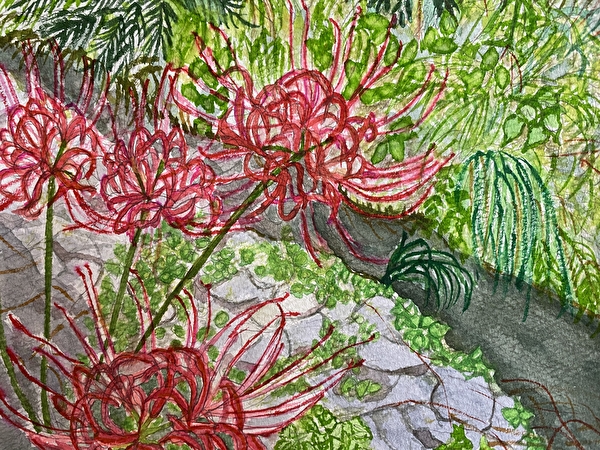Red spider lilies are called “Higanbana” in Japanese, because they are in bloom around the autumnal equinox (aki-higan). They are native to China and came to Japan a long time ago.
They are toxic plants containing a poison called lycorine. If you accidentally eat it, it causes you nausea and diarrhea and can lead to neuroparalysis and even death. But unless you take a lot of it, it usually doesn’t cause death.
It is said that people planted them on banks, ridgeways between rice fields, and cemeteries in Japan to protect crops and bodies buried in the earth from living things, such as moles, rats, and insects, because such living things hate and avoid their poison.
There are some superstitions about red spider lilies in Japan.
For example, “If you take red spider lilies home with you, your house will catch fire.”
“If you pick red spider lilies, your hands will rot.”
“If you decorate red spider lilies in your house, your parents will die soon.”, and so on.
It is said that these superstitions might have been wisdom to prevent children from getting close to red spider lilies containing a poison. I also have believed from my childhood that I mustn’t touch them.

秋の彼岸の頃に花が咲くことから日本では彼岸花と呼ばれます。中国原産の植物で、古い時代に日本に持ち込まれました。
彼岸花はリコリンと呼ばれる毒が含まれる有毒植物です。うっかり摂取すると吐き気や下痢を起こし、中枢神経の麻痺を起こして死に至ることもあるそうです。しかし、大量に摂取しない限り、死に至ることはまずありません。
日本では、モグラ、ネズミ、虫などの生き物が彼岸花の毒を嫌って避けることから、農作物や土葬の死体が荒らされないように、土手や水田の畦や墓地に彼岸花が植えられたと言われています。
彼岸花にまつわる迷信もいくつかあります。
例えば、「彼岸花を持ち帰ると家が火事になる」
「彼岸花を摘むと手が腐ってしまう」
「彼岸花を家に飾ると親が早くに死ぬ」などです。
これらは、毒性のある彼岸花に子どもたちを近づけないための知恵だったのかもしれないということです。私も、彼岸花には触ってはいけない、と子供の頃からずっと信じてきました。
Ikuyo.K.
RECENT POSTS

